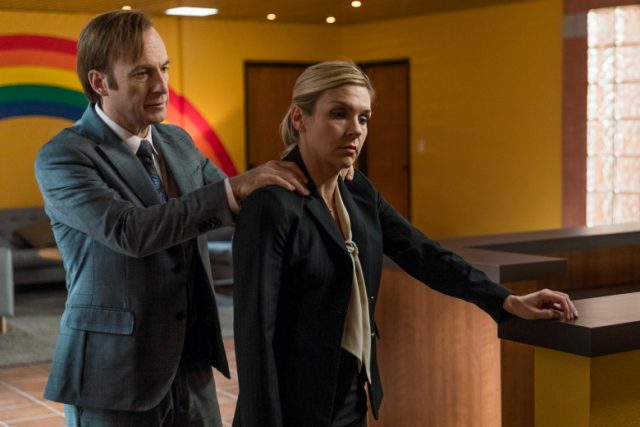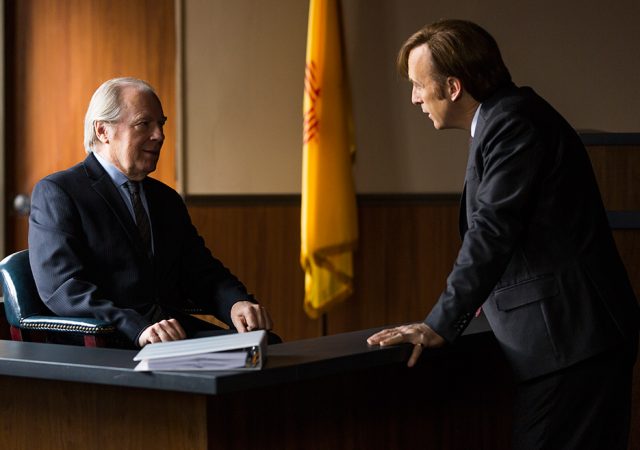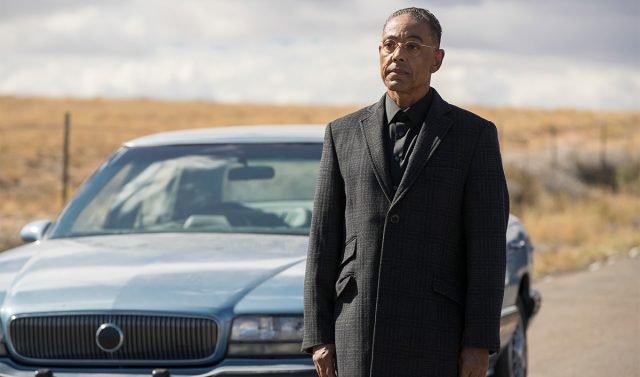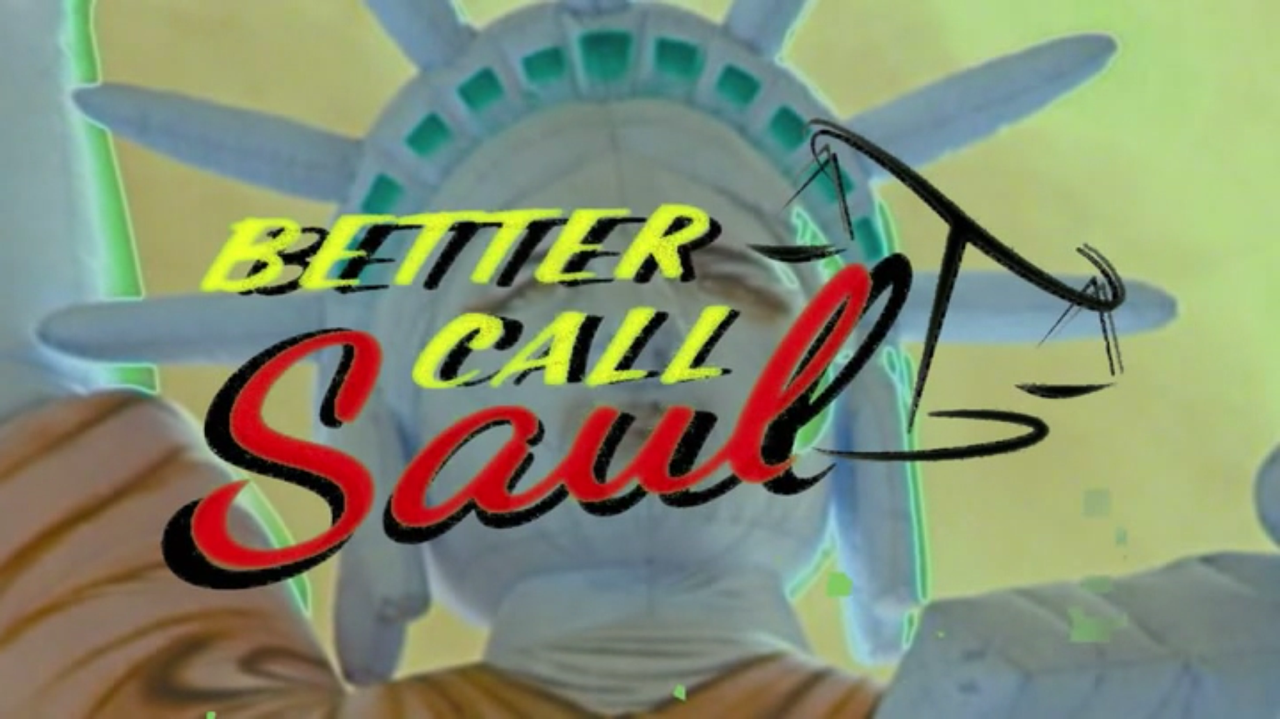NOTE: Spoilers from throughout the third season of, “Better Call Saul” are present in this review
Better Call Saul may have suffered a couple of small hiccups in its second season, as it became a little more muddled and a little less focused, but fortunately, those problems pretty much entirely disappeared in the exceptionally brilliant third season. Season Three of Better Call Saul proved highly satisfying throughout its entire ten-episode duration, and could quite possibly be the show’s best season to date! It’s also a highly rewarding season for Breaking Bad fans to boot, as this represented the show’s biggest steps yet towards connecting Better Call Saul to the future events of Breaking Bad, even though we still have yet to see Walter White or Jesse Pinkman on this prequel series at this point.
Season Three of Better Call Saul did however bring some other familiar faces from Breaking Bad, namely Gus Fring and his associate, Lydia, who ended up becoming a key part of Mike Ehrmantraut’s ongoing subplot in the series. Fring is already thriving as an undercover drug kingpin who is beloved by the civilian community even during Better Call Saul’s events, and while he was more of a background presence in a season that appropriately re-focused more on the fall of the McGill brothers, he still provided some standout appearances that also effectively filled in some story holes from Breaking Bad, including how Mike ends up being one of his key fixers. Mike’s storyline did end up petering out towards the end of the season, to the point where Mike didn’t even appear at all in the season finale, which is one of the only noticeable issues with Season Three of Better Call Saul, but that’s ultimately a very minor gripe, since we’re bound to further flesh out the Fring/Mike relationship in this show’s inevitable fourth season.

Even though he’s not a presence on Breaking Bad proper, Nacho’s tertiary subplot also took some big strides in Season Three of Better Call Saul, and tied in very exceptionally with the brewing rivalry between Fring and Hector Salamanca. With Fring being favoured by the cartel overlord of New Mexico, Hector’s rage and jealousy leads to his character becoming more heavy-handed and intimidating than ever this season, even if this also leads to his predictable downfall. Fans of Breaking Bad already know that Hector will be rendered paralyzed and mute by a stroke for the events of Better Call Saul’s original inspiration, and seeing Nacho seemingly play a crucial hand in that stroke, resulting from an assassination attempt that obviously fails, was pretty rewarding. Nacho became an extra fleshed-out and multi-dimensional character more than ever in Season Three, and while he’ll probably end up six feet under before the end of this prequel series, seeing him struggle with his own sense of loyalty and principles in the criminal world provides a great way to humanize this show’s criminal element, even more than Breaking Bad often did.
As I said though, a crucial part of what made Season Three such a huge success for Better Call Saul is in how it refocused the core of the storyline on Jimmy McGill, the future Saul Goodman, as well as his brother, Chuck. Both of the McGill brothers have hit their share of stumbles and obstacles over the previous two seasons, especially when they clash with each other, but Season Three seemed to showcase the proper destruction of both of them as we previously knew them. This was appropriately timed with Jimmy debuting his alter-ego of Saul Goodman for the first time this season, albeit not as a criminal attorney, but instead as an undercover commercial filmmaker trying to offload Jimmy’s ad time, after a dust-up with Chuck leads to Jimmy being suspended from practicing law for a year.

This big battle between Jimmy and Chuck has been a long time coming, and was foreshadowed at the end of Season Two, when Chuck secretly recorded Jimmy admitting to gaslighting him, and ruining his reputation so that Kim could be built up with Mesa Verde. Granted, this is illegal evidence, and wouldn’t be admissible in a court of law, but Chuck nonetheless had another plan up his sleeve, as he used the tape to at least get Jimmy called before the bar, resulting in a bar hearing that fully founded one of the season’s best episodes, “Chicanery”, at the exact halfway point of the season. This battle doesn’t have any winners either, as Jimmy ends up suspended from law for a year, forcing him to invent Saul Goodman, while Jimmy’s defense strategy publicly outs Chuck’s electromagnetic sensitivity as psychosomatic, which does allow Chuck to recover, but at the cost of him running wild at HHM, and eventually being booted out of the firm.
As much as Breaking Bad fans can start tracing Jimmy’s path to ruin from here, it was Chuck that seemed to bear especially big consequences for his vendetta against Jimmy, even when Chuck initially seems to be thriving more than ever towards the end of the season. After his crusade sees him lose everything, Chuck seemingly kicks over a lantern and allows his house to burn down in the final seconds of the season, suggesting that Chuck may have committed suicide, having been left with nothing by his own hand. The showrunners have confirmed that Chuck won’t disappear from the series here, since, even if he’s dead, he’ll still appear in flashbacks and the like, but still, seeing Chuck pay such a high price felt fitting, especially since he inadvertently contributed to the creation of Saul Goodman. This effectively gives Chuck his own indirect influence over the events of Breaking Bad, considering how Jimmy/Saul plays into the future endeavours of Walter White and his meth operation, and was another great way to provide a character’s specter in this show’s future, much like how Nacho is being handled, even when that character proper doesn’t show up at all in Breaking Bad.

On one last note, Kim and Howard being used as the respective foils and eventual brief casualties of Jimmy’s and Chuck’s negligence and selfishness was also subtly and smartly portrayed throughout Season Three. Jimmy tried his best to be there for Kim, granted, but as Kim was pulled into Jimmy’s orbit all the more, now sharing an office and a battle against Chuck with him, Kim eventually burns out and finds herself in over her head, culminating in her nearly killing herself in a car crash towards the end of the season. Likewise, Howard’s arrogance throughout the season ultimately poured gasoline on the fire of Chuck’s out-of-control psychology, with Howard ultimately having to pay through the nose to get rid of Chuck for good at HHM, which may or may not have consequences later. One has to wonder if Chuck’s likely suicide will ebb away at the firm he helped create, and how that may affect Howard down the road. Something tells me that, if Howard forcing Chuck out of HHM comes to light, Howard may be in for a world of legal hurt, especially if Chuck is indeed dead now.
Even now, a week after Season Three has ended at the time of writing, AMC strangely hasn’t yet officially renewed Better Call Saul for a fourth season, though as I’ve mentioned more than once, the network ordering a new season is no doubt a question of ‘when’, not ‘if’. Considering that Better Call Saul is one of the most acclaimed and beloved premium cable shows on the air right now, and that’s before factoring in the outstanding legacy of Breaking Bad, there’s no way that AMC will suddenly cancel the series without a proper pre-determined ending. We’ll no doubt eventually get answers regarding Chuck’s fate, and the consequences involved for all of the other characters’ actions this past season, but regardless, Better Call Saul has never been stronger as of the end of its third season. The re-introduction of Gus Fring to this universe went over very well, as did the show more quickly moving towards the state of events for Breaking Bad. It was also awesome to see the series re-focus itself and feel more tightly-paced and satisfying in Season Three, while at the same time delivering some of its best character arcs to date across the board. It’s possible that the inevitable Season Four of Better Call Saul could very well be the show’s last, but if it’s half as good as Season Three, we’ll at least be able to look forward to the tragic tale of Jimmy McGill closing out on a high note!

